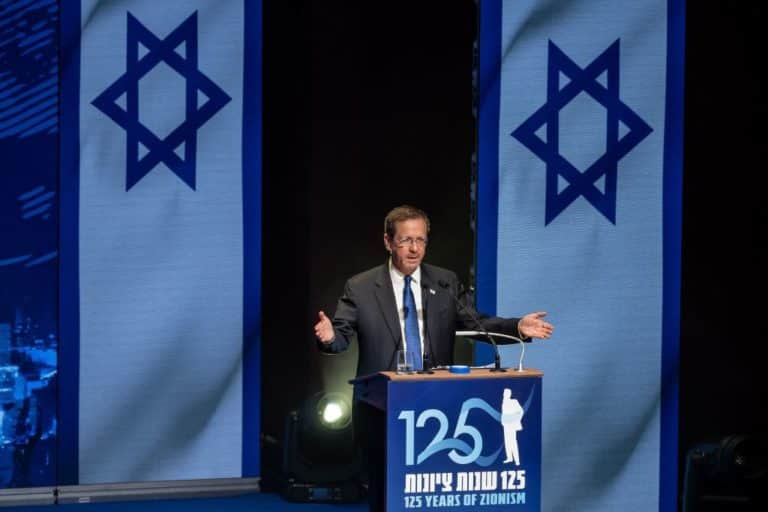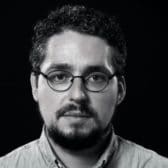
Last week was the 125th anniversary of the first World Zionist Congress and in honor of the occasaion some 1,400 delegates from around the world assembled in Basel, Switzerland, to mark the milestone.
“Many of us were born into the reality of the State of Israel existing as a sovereign, powerful, Jewish and value-based entity,” World Zionist Organization Chairman Yaakov Hagoel said in a press release. “But just five generations before, it was a distant dream. In a conference hall in Basel, the hearts of the delegates of the First Zionist Congress were stirred, paving the way for the establishment of the Jewish State.”

It’s been 125 years since Theodor Herzl convened and chaired the first meeting, famously telling those gathered in 1897: “We shall live at last as free men on our own soil.”
Days after Basel ended, Herzl wrote in his diary:
“Were I to sum up the Basel Congress in a word — which I shall guard against pronouncing publicly — it would be this: At Basel, I founded the Jewish State. If I said this out loud today, I would be answered by universal laughter. Perhaps in five years, certainly in fifty, everyone will know it.”
Theodor Herzl
Herzl gave birth to the modern Zionist movement, but sadly he did not live to see his dream become a reality. And, in the wake of the 125th anniversary of that fateful first gathering, we wanted to take a look at the themes that developed out of this year’s conference and see how Zionism is evolving as modern Israel closes in on its 70th anniversary of its founding.
A different kind of meeting

But first, this year’s gathering was different than past World Zionist Organization gatherings. As the Jerusalem Post noted, mostly absent were the politicians.
The 1,400 attendees were reportedly a cross-section of mainly American Jewish and Israeli life.
Several Knesset members did attend, as did senior officials from nearly every major Jewish organization, but what made this conference different was “the number of young Israeli businesspeople, who are taking part in a portion of the conference focusing on entrepreneurship.”
“I think that the really important thing that happened at the conference, happened by accident,” Michael Eisenberg, an American-born Israeli businessman, venture capitalist and author, told The Jerusalem Post, after returning from Switzerland.
“In his opinion this event was successful because there were basically no politicians there, and that enabled an important meeting between civic, technology and business entrepreneurs,” wrote the Post’s Zvika Klein.
Reclaiming Zionism
In his opening remarks to delegates, Israeli President Isaac Herzog called for a reclamation of the word “Zionism,” saying that the word has been turned into a slur– adding that it was the mission of this generation’s Zionists to fix the problem.
I was deeply moved to mark 125 years since the First Zionist Congress in Basel, in the same place where Theodor Herzl convened the original event—a formative moment that would change the course of Jewish and human history forever. pic.twitter.com/DjpQjDW61O
— יצחק הרצוג Isaac Herzog (@Isaac_Herzog) August 29, 2022
“We must fight this antisemitic and anti-Zionist approach; history has already shown what dark depths it can reach,” Herzog told the crowd at Basel.
“We must reclaim the term ‘Zionism’ for ourselves, with our heads held high and our backs straight, as an expression of our own national identity, traditions, hopes, pride, enlightened values, justice, and commitment to tikkun olam. I appeal to you all, dear brothers and sisters, with this clear and lofty call: we must reclaim Zionism! This is the mission of our generation.”
“Israel’s existence has not ‘solved’ antisemitism,” commented Jonathan Greenblatt, CEO of the Anti-Defamation League, who also attended the 125th anniversary gathering.
“We cannot guarantee a secure Jewish future without strong efforts to push back against the extreme anti-Zionism rampant in many countries and seeping into international forums and places like legislatures and college campuses.”
Diaspora Zionism
In an article published in the Swiss-Jewish newspaper Tachles, Herzog said that Herzl “left us unfinished business,” stating that the other “primary task of our generation” was to strengthen “our collective Jewish sense of togetherness” between Israel and the Diaspora.
“We are too small as a people, and the stakes are too high, not to cultivate a rich, vibrant, dynamic Jewish culture that draws inspiration from the diverse mosaic of the Jewish people and its history and traditions around the world,” Herzog wrote.
Diaspora Relations Minister Nachman Shai made news at the conference for also proposing a reversal in thinking when it comes to handling Jews living in the Diaspora.
“Today, 125 years after that pivotal congress, the paradigm has changed. The State of Israel is thriving and leading in many fields — and it is now time to ask what Israel can do to secure the destiny of the Jewish people and Jewish resilience around the world,” he said.
Shai even went as far as invoking American President John F. Kennedy:
“Ask not what the Diaspora can do for Israel – ask what Israel can do for the Diaspora.”
In addition to his comments at Basel, the minister also penned an op-ed in Friday’s Jerusalem Post outlining his vision.
“Almost eight million people – half of the entire Jewish population – choose to live, flourish, strive and build vibrant communities outside of Israel,” Shai pointed out in his column.
“This leads us to crucial questions. Where does Israel, as the nation-state of the Jewish people, actually stand vis-a-vis the Jewish people? Do we care for them and they for us? And is the Zionist dream only about aliyah? Or perhaps there is a wider, bigger definition of what Zionism is all about?”
Shai then goes on calling for a “new strategic shift” between Israel and the Diaspora.
“It is of utmost importance that we find ways to integrate the voices of the diaspora into the decision-making processes of Israel,” he wrote. “Many of the decisions we make in Jerusalem affect not only the citizens of Israel but Jewish communities around the world alike.”
“And Israel, now a strong and blossoming state, takes on its duty to secure the resilience of the Jewish people in Israel and around the world,” he concluded.
New Zionism
“After realizing the Zionist dream of a strong, democratic and liberal Jewish state, the narrative of the new Zionism must be a desire and action for a better world,” Mitrelli Group founder and President Haim Taib said in a speech titled “New Zionism.”
Taib made headlines back in Israel for his comments linking Zionism with Tikun Olam, or repairing the world.
“I clearly see the chain that connects the Zionist narrative, our work in Africa and improving social welfare in Israel. From my point of view, this is universal Zionism – Tikkun Olam in the name of the State of Israel and the Jewish people, for a better world,” Taib added.
Originally Published Sep 6, 2022 10:32AM EDT


